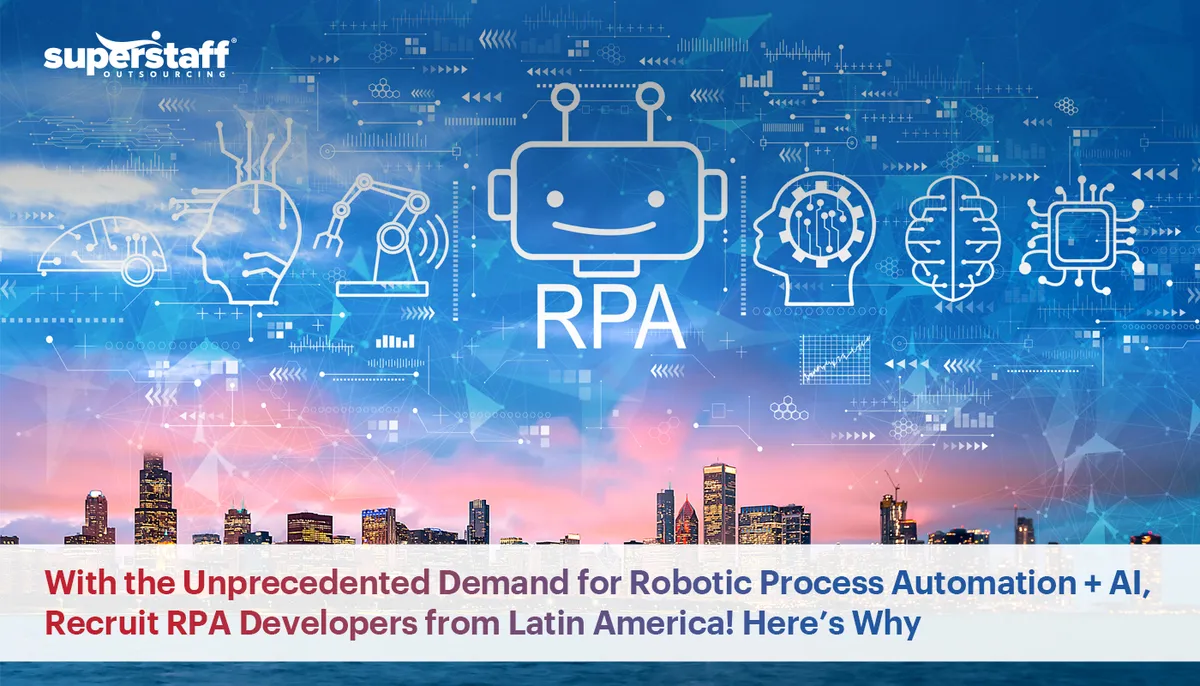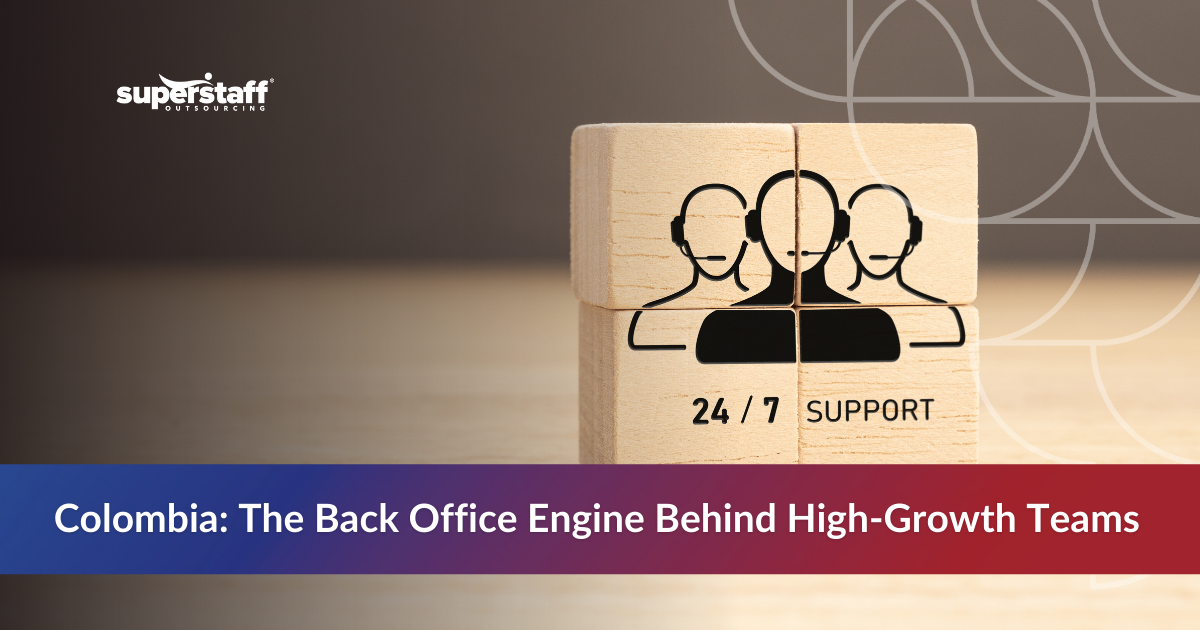
The synergy between Robotic Process Automation (RPA) and Artificial Intelligence AI ushered in a new era of automation. AI introduced a level of intelligence that enhances RPA’s capabilities, enabling more nuanced automation of tasks through subjective or unstructured data.
However, to fully harness the potential of this convergence, organizations require reliable and skilled RPA developers to navigate the complexities of implementation and integration. Amid global talent shortages in tech, businesses increasingly turn to more innovative workforce strategies.
One of the most potent combinations emerging is outsourcing integration in the RPA+AI formula. As organizations navigate the evolving landscape of automation, nearshoring an RPA developer team promises to unlock unprecedented efficiencies and propel digital transformation forward.
What is Robotic Process Automation?
Think of Robotic Process Automation RPA as a 24/7, all-around assistant for your business—but instead of a person, it’s a hyperintelligent computer program. These software robots learn to do repetitive tasks like you would, but much faster and without mistakes.
Imagine all those tedious tasks your team does daily, like copying data from one system to another, filling out forms, or processing invoices. RPA takes all of that off your plate. You just show it how to do the task once, and then it seamlessly replicates the process like a well-oiled machine.
The beauty of RPA lies in its versatility. It can work with automation anywhere and everywhere, whatever software or system you use in your business. Jumping in wherever needed, RPA can handle tasks in your customer service system, finance software, IT, and more.
Maximizing RPA Potential: Why Outsourcing RPA Developers is the Smart Choice
Technology to streamline operations and drive efficiency is no longer just a competitive advantage — it’s a necessity for survival. While RPA has emerged as a powerful tool for automating repetitive tasks, reducing errors, and enhancing productivity, implementing RPA requires specialized expertise and resources, which many organizations may not have in-house.
This is precisely why outsourcing RPA developers has emerged as a strategy increasingly more businesses leverage.
Access to Specialized Expertise
RPA development is a specialized field that demands a deep understanding of automation technologies, programming languages, and business processes. Fortunately, outsourcing developers allow businesses to tap into a pool of experienced professionals with the necessary RPA development skills and expertise to design, implement, and maintain robust automation solutions tailored to your business needs.
These developers bring valuable insights and best practices gleaned from working across various industries and projects, ensuring the success of your RPA projects.
Faster Time to Market
Outsourcing RPA development can also significantly fast-track the implementation of your automation projects. External developers are typically well-versed in agile development methodologies and have streamlined processes to speed project delivery.
With their focused expertise and dedicated resources, they can quickly assess your automation requirements, develop custom solutions, and deploy them into production, helping you realize the benefits of RPA faster and gain a competitive edge in the market.
Cost Savings
Another prominent advantage of RPA developer outsourcing is cost savings — arguably the most significant reason businesses outsource.
With outsourcing, you can avoid the overhead costs of recruiting, training, and retaining skilled RPA professionals. Additionally, outsourcing providers often operate on a flexible pricing model, allowing you to scale resources up or down based on project requirements, thus optimizing cost efficiency and maximizing ROI.
Focus on Core Competencies
Outsourcing RPA development also allows businesses to free up resources and focus on core business activities that drive revenue and growth. Instead of allocating valuable time and effort to RPA development, your team can concentrate on strategic initiatives, innovation, and customer-centric activities that add value to your organization.
Service providers enable you to leverage external expertise in automation while maintaining your focus on what you do best, fostering business agility and resilience in a rapidly evolving marketplace.
Risk Mitigation
Experienced providers have a proven track record of delivering successful automation projects and adhering to industry best practices and standards. They also provide ongoing support and maintenance services to ensure the stability and performance of your RPA solutions, minimizing the risk of disruptions and downtime.
Unlocking Colombia’s Tech Potential: Nearshore RPA Developers from Medellin
Colombia has emerged as a vibrant hub for technology talent, with its skilled workforce and favorable business environment attracting attention from companies worldwide. Among the cities leading the charge is the tech hub Medellin, a bustling metropolis in the heart of Colombia’s picturesque Andes Mountains.
Renowned for its innovative spirit and entrepreneurial culture, Medellin is rapidly gaining recognition as a premier destination for nearshore outsourcing, particularly for talent with programming and developing skills.
Vibrant Tech Workforce
Medellin boasts a robust ecosystem of tech talent fueled by top-tier universities, specialized training programs, and a thriving community of developers, engineers, and innovators. The city’s vibrant startup scene and government initiatives to promote entrepreneurship have further accelerated the growth of its tech sector, attracting multinational corporations and startups alike.
Travel and Time Zone
Medellin offers a compelling nearshore outsourcing option for companies leveraging RPA to streamline operations and drive efficiency.
Situated in the same time zone as North America and with convenient travel connections, Colombia provides a seamless collaboration experience for companies looking to engage with nearshore RPA developers. This proximity enables real-time communication, fosters closer collaboration, and minimizes the challenges often associated with offshore outsourcing.
Cost-Effective Solutions
Compared to onshore development rates, nearshore RPA developers in Colombia offer competitive pricing without compromising quality. The lower cost of living and favorable exchange rates contribute to significant savings for companies outsourcing their RPA development needs to Medellin. This makes Colombia an attractive destination for businesses looking to maximize ROI while accessing top-tier talent.
Cultural Advantage
Beyond its technical prowess, Medellin also boasts a rich cultural heritage and a workforce known for its resilience, creativity, and adaptability. Colombian developers are renowned for their strong work ethic, teamwork skills, and proficiency in English, making them an ideal fit for international collaboration.
Moreover, the cultural affinity between Colombia and many Western countries fosters a collaborative and cohesive working environment, facilitating seamless integration with global teams.
Industries Leading the Charge in the RPA Revolution
With 66% of businesses already automating their processes, increasingly more companies are taking a step toward hyperautomation. However, a few industries stand out as trailblazers in embracing Robotic Process Automation services. Let’s delve into the benefits of RPA and how it is changing the game for these sectors.
Customer Service
With e-commerce on the rise, customer service (CS) teams can easily struggle to keep up with the relentless stream of customer requests.
Frustrated customers wait on hold; others receive delayed email responses, leading to dissatisfaction and negative reviews. Despite CS teams’ best efforts, manual processes for order tracking, return processing, and product inquiries prove time-consuming and error-prone, exacerbating the situation.
The volume and complexity of touchpoints far exceed their capacity, dwindling employee morale and putting the bottom line at risk. The answer to this universal problem is RPA.
Nowadays, consumers are three times more likely to transact online. In this era, RPA streamlines repetitive tasks like data entry, ticket routing, and response generation, allowing customer service representatives to focus on high-value interactions. With hyperautomation, businesses can enhance response times, accuracy, and customer satisfaction.
Accounting and Bookkeeping
Financial services are the lifeblood of any business, fueling the engine that drives growth, sustains operations, and steers strategic initiatives. As the organization’s heart, they pump vital resources into every corner of its operations.
From managing budgets and cash flow to analyzing financial data and forecasting future trends, finance teams play a pivotal role in decision-making and ensuring fiscal health. Accounting and bookkeeping departments monitor revenue streams, control expenses, and optimize investments to maximize profitability and shareholder value.
While crucial, this task can be tedious, especially for businesses with limited resources. Fortunately, RPA technology can help. Finance and banking institutions leverage RPA to automate account reconciliation, transaction processing, compliance reporting, and fraud detection.
It ensures data accuracy, improves regulatory compliance, and enhances operational agility. Ultimately, automating repetitive tasks empowers financial organizations to optimize resources while delivering superior services.
Back Office
While front-office teams engage directly with customers and clients, the back office works diligently behind the scenes to ensure that operations run efficiently and effectively. They are the backbone of any organization, providing essential support functions that enable the smooth operation of the entire business.
One key reason the back office is important is its role in maintaining operational efficiency. Back-office functions such as finance, human resources, and IT manage critical processes such as payroll, invoicing, data entry, and administrative tasks. However, many organizations find themselves bogged down by the demands of their back-office operations, which often entail repetitive, time-consuming tasks that drain resources and hinder productivity.
This is why businesses offering back-office services rely heavily on RPA tools. Half (50%) of business leaders plan to automate even more tasks such as data entry, document processing, and inventory tracking to boost efficiency, reduce errors, and accelerate processes, thereby enabling them to reallocate resources to strategic initiatives.
IT, Programming, and Development
Let’s say an IT and Programming team is overwhelmed by a barrage of technical issues that are out of their hands. With deadlines looming and projects at risk, tensions run high as the team scrambles to troubleshoot problems and keep operations running smoothly.
Organizations’ Employees struggle to access critical systems and applications, hindering productivity and causing frustration. Helpdesk tickets pile up faster than they can be resolved, leaving end-users waiting anxiously for assistance.
Meanwhile, the IT team faces mounting pressure from upper management to resolve issues swiftly and prevent further disruptions to business operations. This worst-case scenario can be easily avoided with the help of RPA.
RPA software automates routine tasks such as software installation, patch management, and system monitoring. It enhances operational efficiency by reducing manual intervention, which, in turn, accelerates incident resolution and minimizes downtime.
As a result, IT professionals can allocate more time to strategic initiatives, innovation, and addressing complex issues. This is precisely why many IT decision-makers believe automation is critical for digital transformation.
Recruitment
Effective talent acquisition strategies are more critical than ever in today’s labor shortages and fierce market competition. This is why adopting proactive and innovative approaches to talent acquisition and recruitment is imperative to stay ahead of the curve and secure the talent needed for business success. One such strategy is RPA.
RPA streamlines resume screening, candidate sourcing, interview scheduling, and onboarding processes. By automating time-consuming tasks, RPA enables recruiters to focus on building relationships with candidates, conducting interviews, and making strategic hiring decisions. It enhances recruitment efficiency, reduces time-to-hire, and improves the candidate experience.
Retail
The retail landscape has transformed from traditional brick-and-mortar stores to a predominantly online marketplace. With the click of a button, shoppers can browse a sea of products, compare prices, read reviews, and make purchases on the go or from the comfort of their homes.
On the retailers’ end, things are evolving as well. Nowadays, they harness RPA to optimize inventory management, order processing, pricing analysis, and customer data management.
RPA enables retailers to automate repetitive tasks across the supply chain, enhance operational efficiency, and deliver seamless omnichannel experiences to customers. Ultimately, automation allows them to focus on improving customer engagement, driving sales, and fostering brand loyalty.
Logistics
In this digital-first landscape, even supply and logistics are guided by tech. Automation has become the driving force behind modern logistics, enabling greater efficiency, agility, and innovation in the movement of goods.
Logistics companies utilize RPA to automate route optimization, shipment tracking, warehouse management, and freight invoicing. RPA improves logistics efficiency, reduces costs, and enhances supply chain visibility. By automating repetitive tasks, logistics firms can optimize resource allocation, mitigate risks, and deliver superior logistics services to customers.
As these industries embrace RPA, they pave the way for enhanced efficiency, agility, and innovation. With RPA’s transformative power, organizations across sectors can unlock new opportunities, drive growth, and stay ahead in today’s dynamic business landscape.
Intelligent Automation (IA): The Synergy of RPA and Artificial Intelligence
A McKinsey report illuminated the challenges organizations face in achieving success with their automation initiatives. Only 55% reported success. RPA had promised substantial returns on investment, yet many struggled to realize its full potential.
Fortunately, the landscape has transformed since then, with the integration of RPA and AI technologies giving rise to hyperautomation. This paradigm combines multiple automation capabilities to open new vistas of efficiency and innovation.
The Predicament of Pre-AI RPA
The complexity and variability of seemingly straightforward tasks often plagued pre-AI RPA endeavors.
Take, for instance, the task of analyzing and routing invoices within an organization. What appears simple at first glance becomes intricate when confronted with many document formats. Standardizing each invoice or programming bots to handle diverse document variations posed significant challenges, turning what seemed like a simple RPA initiative into a complex and costly endeavor.
Infusing AI
AI injects a layer of intelligence into RPA that was previously unattainable. While RPA excels at handling straightforward, structured, and objective tasks, AI extends its capabilities to encompass nuanced, subjective, or unstructured data. Combining these two powerful tools enables businesses to automate a broader spectrum of processes.
Hyperautomation in Action
Accurate Document Processing
Businesses can train AI models to read and categorize complex documents, eliminating the need to manually program bots for different document formats. This capability extends to interpreting handwriting and streamlining processes like managing purchase orders.
Interpretation of Free-form Text
AI-powered bots can comprehend and categorize free-form text, such as customer emails, freeing up your workforce for more strategic tasks while enhancing accuracy over time.
Image Analysis
AI augments RPA by enabling the analysis of images efficiently, and identifying discrepancies or errors. For example, a food and beverage company utilizes AI-powered automation to ensure the accuracy of product labels, mitigating reputational risks and regulatory fines.
Streamlining Report Generation
Leveraging AI-driven RPA also helps businesses streamline the generation of complex reports, saving time and resources previously spent on manual data extraction and formatting.
Classification of Complex Information
Automation, combined with custom rule based machine learning models, enables the classification of intricate information, expediting processes like loan assessments.
Harness the Power of Robotic Process Automation With SuperStaff
As the demand for RPA continues to surge, Medellin is well-positioned to capitalize on its tech potential and emerge as a leading destination for nearshore Robotic Process Automation solutions. With its skilled workforce, cost-effective solutions, and cultural compatibility, Colombia offers a compelling value proposition for companies looking to unlock the full potential of automation while maintaining a competitive edge in today’s digital economy.
SuperStaff’s solutions give you access to a talented pool of professionals ready to tackle tasks with precision and expertise, saving you valuable time and resources. Our proven track record in managing remote teams ensures smooth collaboration and communication, guaranteeing timely project delivery and superior results.
Why settle for mediocrity when you can partner with SuperStaff and elevate your business to new heights? With SuperStaff by your side, success is an achievable reality.






